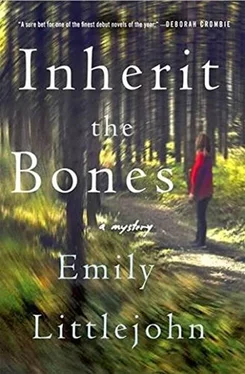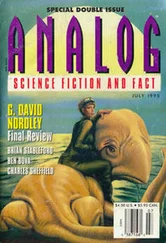We’d spent a grand building the fence; it was nine feet high and reinforced with discreet steel planks hidden behind pine panels. Since its completion a year ago, we hadn’t had a single problem with bears in the garbage. And I had stopped worrying that Seamus would become a snack for a mountain lion.
The house was quiet save for the ticking of the timer I used for the fish and potatoes, and the sound of Seamus coming and going through the back door. He’d come in, whine a bit, and then go back out. After his fourth rotation, I pushed myself off the couch and went to the door.
“Seamus?” I called to him. “What is it, boy?”
The backyard was dark and I heard him snuffling in the garden at the side of the house. I flipped the switch for the porch light and waited for the thing to come on but it didn’t and I flipped it up and down and then cursed, remembering. The bulb had burned out during a dinner party we’d thrown a month ago.
I thought Brody replaced the light but he must have forgotten.
“Seamus! C’mon boy, come here,” I called. The snuffling stopped, and then started up again with another funny little whine. “Seamus! Get in here.”
He emerged from the dark with dirt on his nose and a guilty look on his face, and as I pulled the back door shut behind him, I got the sense that something, or someone, was in the yard.
I don’t scare easily but the silence was eerie and it made the hairs on the back of my neck stand up. I held my breath and listened and heard none of the usual nighttime sounds of the forests: the screech of crickets, the breeze in the pine boughs or the scratch of rodents.
A deep silence descended over the yard, so deep I could hear my heart thudding in my chest. I stepped back into the kitchen and bolted the back door and drew the curtains on the windows above the sink. I thought of going upstairs and getting my gun but the feeling passed. It was likely a raccoon or bobcat up the street; the prey all seem to play freeze when they sense a predator in the neighborhood.
I ate my dinner on a tray in front of the television and with every news story, grew more and more depressed. Another war in a faraway country, another parent doing something horrible to their child, more bloodshed, more sadness. I switched to a local news station and saw Terence and Ellen Bellington standing at a podium, holding hands, and I upped the volume.
They were in the pressroom at City Hall; I recognized the heavy velvet indigo curtains that hung behind them, embroidered in gold and scarlet thread with the state and town crests. The mayor’s chief of staff, a somber old bird whose name I couldn’t remember, stood to his left. To his right stood Chief Chavez.
I didn’t see Annika. Perhaps she was in the audience.
Mayor Bellington raised a hand for silence and then spoke. “Thank you all for coming, I know the late notice was a surprise. I’m going to read a short statement that my wife and I have prepared. We won’t be taking any questions tonight. You can contact my office, or the police department, in the morning for further information.”
He cleared his throat and I watched as Ellen gave his hand a squeeze. She wore a navy suit that made her pale hair and skin look ghostly. In contrast, the mayor wore dark slacks and a light blue V-neck sweater, with a pastel tie. Somehow it all worked.
“As many of you know, the body of a young man was found Monday afternoon at the fairgrounds. The victim was a clown, an employee of the Fellini Brothers’ Circus. What began as a routine murder investigation took a surprising turn when it was discovered that the young man is none other than our son, Nicholas Patrick Bellington.”
The mayor raised his hands again at the chatter that burst forth from the audience, waiting until the room was quiet again before speaking.
“Three years ago, the good citizens of Cedar Valley granted my family privacy and respect as we grieved for our son, Nicky. I ask you now, not as your mayor, but as your neighbor, and I hope your friend, for that same courtesy once again,” he said.
The mayor stepped back from the microphone and without another word, walked off the stage with Ellen in tow. The room erupted and Chavez took the podium.
“Chief! Chief Chavez! Do you have any leads?” a squeaky voice rang out above the others. I recognized it as that of our local news anchor, Missy Matherson, a bottle blonde with a little too much ambition and not nearly enough empathy.
“Missy, you heard the mayor. We’ll be taking all questions in the morning,” Chavez said. He was comfortable at the podium and his genuine manner seemed to settle the room down. For the first time, I realized that he could easily run for office someday and likely win, and I wondered if the same thought had ever crossed his mind.
He said, “Y’all come down to the station about nine, we’ll have coffee and doughnuts and I’ll tell you everything I can.”
The mayor’s chief of staff, still on stage, leaned over and whispered something in Chavez’s ear. He listened and then nodded.
“The mayor’s office will be available for questions, as well, in the afternoon,” he added.
“Chief! Is the mayor still planning a rumored run on the Senate office in next year’s elections?” Missy Matherson shouted. “What about his cancer, is such traumatic news going to affect his recovery?”
I put down my fork in disgust. The woman was colder than a steak in the freezer.
Chavez had been in the process of stepping away from the podium, but now he came back and leaned into the microphone. If I knew him, he’d have a zinger.
“Folks, it’s been a long couple of days. We’ve got a dead man-a kid, really-and tonight, a good family grieves. I can’t speak for the mayor, but I’d guess politics is the furthest thing from his mind at the moment.”
I turned the TV off and felt a wave of anxiety wash over me. It was a shitty, shitty world at times and here we were, bringing a baby into it. By the time the Peanut was my age, was there going to be a world worth enjoying? What if something happened to me, or Brody? I knew what it was like to grow up loved, protected, cherished, only to have that security ripped away in a few seconds of screeching tires and screaming engines.
I’d had a few of these panic attacks early in the pregnancy and Brody’s response had never wavered. “We’re bringing a baby into this world not with fear, but with love. We can’t be afraid of life.”
I wasn’t afraid of life. I was just terrified of how different life might look for my daughter.
I brushed my teeth and used the restroom and put my nightgown on. I climbed into bed; my body was exhausted but my mind refused to rest. Next to the bed, my cell phone buzzed on top of the nightstand. I checked the caller ID; it was my grandmother.
“Julia? Are you all right? It’s late,” I said.
Silence.
“Julia?”
“We just watched the news. Gemma, listen to me. You’ve got to be careful now, stay away from him. He’s got a sickness. He’s a virus,” my grandmother whispered. She spoke quickly, her words tumbling over one another.
“Stay away from who, Mayor Bellington? What on earth are you talking about?”
Julia sighed. “Think, you little idiot. What do viruses do? They seep in and infect and spread. Oh no, oh no, your grandfather’s done in the can. I’ve got to go, he can’t know I called you. Did you hear me? Stay the hell away from that man.”
She hung up and I slowly set the phone down, chilled to my core. She’d never spoken to me that way, and I was rattled. What man did she mean?
I lay back in bed and pulled the covers up as high as they could go before they’d smother me. Slightly over forty-eight hours had passed since we’d discovered Nicky Bellington, aka Reed Tolliver’s, body. The people in both boys’ lives circled in my thoughts like pieces in a chess game; like vultures in the sky.
Читать дальше

![Лаура Бренз - Потомственная ведьма[Inherit the Witch]](/books/79609/laura-brenz-potomstvennaya-vedma-inherit-the-witch-thumb.webp)










